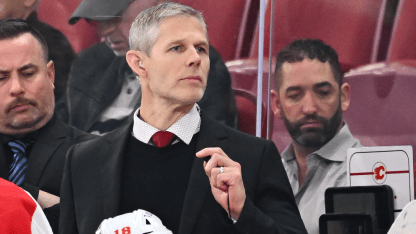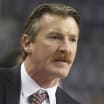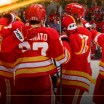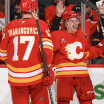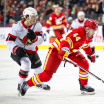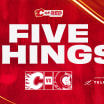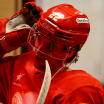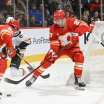The Flames powerplay started to percolate in the final weeks of last season.
Under the guidance of Cail MacLean, it’s ready to hit a full boil come the fall.
The Calgary assistant coach has added powerplay responsibilities to his portfolio for the upcoming campaign, and he’s ready to help develop a strategy for his playmakers, a foundation to help the Flames take advantage while on the man-advantage.
“First of all, really excited. Really grateful for the opportunity in terms of having the trust shown in me by (Head Coach) Ryan Huska and (General Manager) Craig Conroy in terms of getting a chance to work with the powerplay,” MacLean beamed during a break in the Flames summer coaching meetings held this week at the Scotiabank Saddledome. "Very excited with the options that we have, we had a powerplay that at the end of the year last year really caught fire, and I think there are a lot of aspects of that, that we want to continue to push on, and make sure that with the tools that we have, in terms of the shooters and the skill, that we’re in a position where we can get off on the right foot.”
As he enters his fourth season as a Calgary assistant coach, it’s safe to say the 47-year-old has a grasp of what opposing special teams units have to offer.
But still, MacLean is studious, poring over video to take note of trends and innovations around the league.
“This part of the summer has really been about watching NHL powerplays, trying to read trends, trying to really understand what we do well but also understand what is happening throughout the NHL versus different kinds of penalty-kills, and how we can equip our guys to be ready to take advantage of what we see as opportunities,” he said. “We want our style, but we also want to be able to adapt and make sure we can make plays against any penalty-kill formation.”
MacLean and Huska have a working rapport - they’ve spent three seasons together at the NHL level in addition to a shared campaign at AHL Stockton in 2017-18.
That shared time together leads to a shared mindset, and Huska agrees that keeping a keen eye on successes enjoyed by other NHL clubs can lead to innovation and ideas here at home.
“You see what other teams do really well around the NHL, and if you can take some of those things and kind of make them your own, then we’re going to look at it,” Huska told Flames TV’s Brendan Parker earlier this week. “That’s kind of what these (meetings) are all about, is finding those areas that might give us an advantage with our team as we move forward.”
MacLean inherits a unit that improved vastly over the final stretch of last season. In fact, over the final six weeks of the 2023-24 campaign, the Flames had the NHL’s fifth-best powerplay, converting at a rate of 27.1%.
Nazem Kadri scored six of his 10 powerplay goals over that stretch, while the quartet of Kadri, Andrei Kuzmenko, Yegor Sharangovich and Jonathan Huberdeau combined for 41 powerplay points.
There’s talent abound - MacLean is well-aware - and he’s eager to see his man-advantage specialists harness their creativity this winter.
“When you get a great low player like Kuzmenko around the net, and he knows what his options are, he’s usually going to be pretty intentional about picking the right one and doing it really well,” MacLean explained. “Same thing with our shooters in Sharangovich and the d-men up top.
“Certainly, it is going to be a powerplay that has the tools that, as we’ve seen over the course of the last couple years, we’ve got guys that can really make plays, so we want to make sure we just support them in the nature of giving them the predictability to pick the right option of - hopefully - what is presented in terms of many options.”
That support comes in the form of what MacLean terms a framework - a set of guiding principles to ensure Calgary’s powerplay formation is consistent, and multi-faceted.
But there’s a mindset MacLean will preach of his players as they draw up strategies over the course of the season.
“First and foremost, you have to come out with a 5-on-5 mentality, in terms of how we approach the work ethic and the compete part of the game,” he said. “Because we’re a man up, we’re playing against four really hungry skaters, and we have to make sure that our intensity level surpasses what the penalty-kills are going to bring.
“Once you get beyond that standard of work ethic, then we want to get into building a good framework, so that we have a really good understanding of not a scripted style of play, but a framework that will help us be predictable in terms of what triggers our activities, what triggers our attacks, so that when we see these triggers and when we create them, we have five guys that are really on the same page and are in a fast, attacking kind of mode.
“That’s important, to make sure it’s a simple plan, but it’s one that is really well-understood; that’ll come along with the non-negotiables like the breakout and the O-zone play.”
The strategizing is well underway, and while training camp might appear as a distant mirage under the hot summer sun, it won’t be long before MacLean and his powerplay specialists will be back on the ice, putting their framework into practice.
September can’t come soon enough.
“The big thing is, we have really quality, skilled players,” MacLean said. “We have to give them a framework but after that, we have to allow them to use their instincts to play the game because that’s what they do best.
“They can feel plays, they can make plays so we have to make sure we give them the room to do that.”

